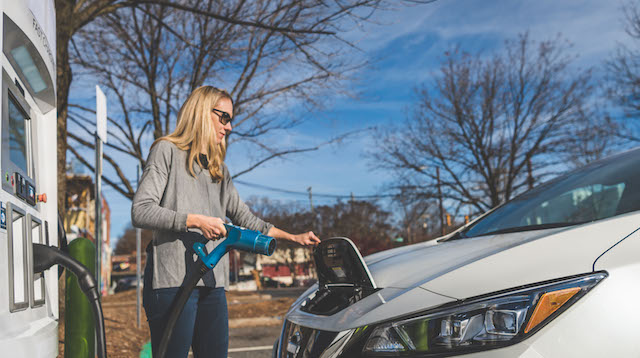On Monday, Duke Energy announced a proposal to make what it says is the largest investment in electric vehicle (EV) infrastructure ever in the Southeast – a $76 million initiative to spur EV adoption across the state.
In the “Proposed Electric Transportation Pilot” filing with the North Carolina Utilities Commission (NCUC), the utility outlined a program that will provide incentives across 7 different segments through the following programs:
- Residential EV Charging;
- Fleet EV Charging;
- EV School Bus Charging;
- EV Transit Bus Charging;
- Multi-Family Dwelling Charging Station;
- Public Level 2 Charging Station; and
- Direct Current Fast Charging Station
The three-year pilot will require NCUC approval.
Duke Energy said that the proposal will lead to almost 2,500 new charging stations in the state.
Currently, North Carolina has more than 10,000 plug-in hybrid and all-electric vehicles. It has approximately 600 public charging stations. This program would more than double that amount.
Details of the different components of the pilot follow:
- A $1,000 rebate for qualifying Level II charging stations for up to 800 residential customers. Level II charging allows customers to charge their EVs up to six times faster than a standard wall outlet.
- A $2,500 rebate for 900 qualifying charging stations for commercial and industrial customers who operate fleets that are transitioning to electric and plug-in hybrid vehicles. Municipalities and universities also qualify for these rebates.
- Financial support to eligible customers to procure up to 85 electric school buses. Duke Energy will install the associated charging infrastructure.
- Duke Energy will install and operate more than 100 electric transit bus charging stations for eligible transit agencies electing to procure electric buses. Electric transit buses eliminate diesel emissions and reduce fuel and maintenance costs for transit agencies.
- Finally, Duke Energy will install and operate more than 800 public charging stations across North Carolina, including DC Fast Charging, Public Level II and multifamily locations, which will expand the state’s network of EV charging stations.
The program follows a similar $10.4 million program being considered ytbxrrvedsdxceytbwuzusfebabxvuvvwefuyby the Public Service Commission of South Carolina.
In its filing, Duke said “the proposed ET Pilot, if approved, would add North Carolina to the growing chorus of states along the east coast, from Massachusetts to Florida, in deploying EV infrastructure to meet the needs of this growing market.”
You can read the filing at this link.





